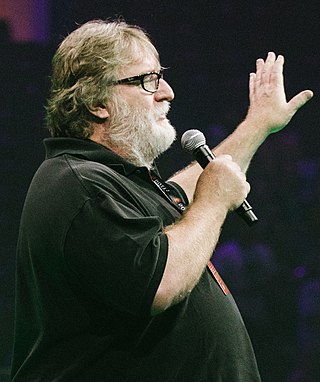
id Software LLC is an American video game developer based in Richardson, Texas. It was founded on February 1, 1991, by four members of the computer company Softdisk: programmers John Carmack and John Romero, game designer Tom Hall, and artist Adrian Carmack.

Xbox Game Studios is an American video game publisher based in Redmond, Washington. It was established in March 2000, spun out from an internal Games Group, for the development and publishing of video games for Microsoft Windows. It has since expanded to include games and other interactive entertainment for the namesake Xbox platforms, other desktop operating systems, Windows Mobile and other mobile platforms, web-based portals, and other game consoles.

The Game Developers Conference (GDC) is an annual conference for video game developers. The event includes an expo, networking events, and awards shows like the Game Developers Choice Awards and Independent Games Festival, and a variety of tutorials, lectures, and roundtables by industry professionals on game-related topics covering programming, design, audio, production, business and management, and visual arts.

Gabe Logan Newell, also known by his nickname Gaben, is an American businessman who is the president and co-founder of the video game company Valve Corporation.

The Bartle taxonomy of player types is a classification of video game players (gamers) based on a 1996 paper by Richard Bartle according to their preferred actions within the game. The classification originally described players of multiplayer online games, though now it also refers to players of single-player video games.
The Digital Game Xpo (DGXPO) was the Southeast U.S.'s largest game industry conference. The event was organized and hosted by Wake Technical Community College in Raleigh, North Carolina. The first event was held in 2005 and it was held annually until 2009. The event comprised an expo, career fair, student showcase, and a variety of tutorials, lectures, and roundtables by industry professionals. The expo also held a number of tournaments for popular games of the time like Guitar Hero, Super Smash Bros., and Halo 3.

Microsoft Ignite is an annual conference for developers, IT professionals and partners, hosted by Microsoft. The first conference, then known as TechEd, happened in 1993 in Orlando, Florida, United States.

Designing Virtual Worlds is a book about the practice of virtual world development by Richard Bartle. It has been noted as an authoritative source regarding the history of world-based online games. College courses have been taught using it.
A social network game is a type of online game that is played through social networks or social media. They typically feature gamification systems with multiplayer gameplay mechanics. Social network games were originally implemented as browser games. As mobile gaming took off, the games moved to mobile as well. While they share many aspects of traditional video games, social network games often employ additional ones that make them distinct. Traditionally they are oriented to be social games and casual games.

Gamification is the strategic attempt to enhance systems, services, organizations, and activities by creating similar experiences to those experienced when playing games in order to motivate and engage users. This is generally accomplished through the application of game design elements and game principles in non-game contexts.
In the video game industry, digital distribution is the process of delivering video game content as digital information, without the exchange or purchase of new physical media such as ROM cartridges, magnetic storage, optical discs and flash memory cards. This process has existed since the early 1980s, but it was only with network advancements in bandwidth capabilities in the early 2000s that digital distribution became more prominent as a method of selling games. Currently, the process is dominated by online distribution over broadband Internet.

Jesse N. Schell is an American video game designer and author, as well as the CEO of Schell Games, and a distinguished professor of the practice of entertainment technology at CMU's Entertainment Technology Center (ETC), a joint master's program between the College of Fine Arts and School of Computer Science in Pittsburgh, Pennsylvania.
In New Zealand, 67% of the population plays video games, 46% of video game players are female and the average age of a video game player is 34. New Zealanders spend an average of 88 minutes a day playing video games.
Wikiracing is a game in which players compete to navigate from one Wikipedia page to another using only internal links. It has many different variations and names, including The Wikipedia Game, Wikipedia Maze, Wikispeedia, Wikiwars, Wikipedia Ball, Wikipedia Racing, and Wikipedia Speedrunning. External websites have been created to facilitate the game.

Gabe Zichermann is a Canadian-American author, public speaker, and businessman. He has worked as a proponent of leveraging game mechanics in business, education, and other non-entertainment platforms to increase user engagement in a process called gamification.

The gamification of learning is an educational approach that seeks to motivate students by using video game design and game elements in learning environments. The goal is to maximize enjoyment and engagement by capturing the interest of learners and inspiring them to continue learning. Gamification, broadly defined, is the process of defining the elements which comprise games, make those games fun, and motivate players to continue playing, then using those same elements in a non-game context to influence behavior. In other words, gamification is the introduction of game elements into a traditionally non-game situation.

Source 2 is a video game engine developed by Valve. The engine was announced in 2015 as the successor to the original Source engine, with the first game to use it, Dota 2, being ported from Source that same year. Other Valve games, such as Artifact, Dota Underlords, Half-Life: Alyx, and Counter-Strike 2, have been produced with the engine.
Bonnie Ross is an American video game developer. She served as Corporate Vice President at Xbox Game Studios, and was the head of 343 Industries, the subsidiary studio that manages the Halo video game franchise. Ross studied technical writing and computer science in college, and worked at IBM before getting a job at Microsoft. She worked on a number of PC and Xbox games, becoming a general manager at Xbox Game Studios.

Yu-kai Chou is a Taiwanese-American entrepreneur, author, speaker, business consultant, and experience designer. He is one of the earliest pioneers in the industry of gamification. He has been a regular keynote speaker lecturer on Gamification at organizations like TEDx Lausanne, Stanford University, Harvard University, Google, Tesla, Lego, Huawei, Uber, Boston Consulting Group, among others. Chou is the creator of the Octalysis Framework and the Co-Founder of the consultancy The Octalysis Group and the mentorship education platform Octalysis Prime.
Video games can include elements that use blockchain technologies, including cryptocurrencies and non-fungible tokens (NFTs), often as a form of monetization. These elements typically allow players to trade in-game items for cryptocurrency, or represent in-game items with NFTs. A subset of these games are also known as play-to-earn games because they include systems that allow players to earn cryptocurrency through gameplay. Blockchain games have existed since 2017, gaining wider attention from the video game industry in 2021. Several AAA publishers have expressed intent to include this technology in the future. Players, developers, and game companies have criticized the use of blockchain technology in video games for being exploitative, environmentally unsustainable, and unnecessary.












